






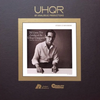
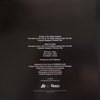
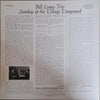
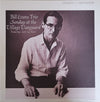


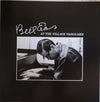
Bill Evans - Sunday at The Village Vanguard (2LP, 45 tours, coffret, UHQR, 200g, vinyle translucide)
ORDER LIMITED TO ONE ITEM PER CUSTOMER
Bill Evans – piano [click here to see more products featuring Bill Evans]
Scott LaFaro – bass
Paul Motian – drums
Written by Scott LaFaro (A1), George & Ira Gershwin (A2), Miles Davis (B1), Bob Hilliard (C1), Sammy Fain (C1), Cole Porter (C2), Scott LaFaro (D1)
2 LP, Box Set
Limited to 5,000 numbered copies
Original analog Master tape : YES
UHQR
Heavy Press : 200g
Vinyl Color : Clear Vinyl
Speed : 45 RPM
Size : 12'’
Stereo
Live
Record Press : Quality Record Pressings
Label : Analogue Productions
Original Label : Riverside Records
Recorded live at The Village Vanguard, New York City on June 25, 1961
Engineered & mixed by Dave Jones
Original session produced by Orrin Keepnews
Reissue produced by Chad Kassem
Mastered by Kevin Gray at Plaza Sound Studio
Originally released in 1961
Reissued in July 2024
Tracks:
Side A :
- Gloria's Step
- My Man's Gone Now
Side B :
- Solar
Side C :
- Alice In Wonderland
- All Of You
Side D :
- Jade Visions
Reviews:
“Sunday at the Village Vanguard is the initial volume of a mammoth recording session by the Bill Evans Trio, from June 25, 1961 at New York's Village Vanguard documenting Evans' first trio with bassist Scott LaFaro and drummer Paul Motian. Its companion volume is Waltz for Debby. This trio is still widely regarded as his finest, largely because of the symbiotic interplay between its members. Tragically, LaFaro was killed in an automobile accident ten days after this session was recorded, and Evans assembled the two packages a few months afterward. While "Waltz for Debby" -- in retrospect -- is seemingly a showcase for Evans' brilliant, subtle, and wide-ranging pianism, this volume becomes an homage, largely, to the genius and contribution of LaFaro. That said, however, this were never the point. According to Motian, when Evans built this trio based on live gigs at the Basin Street East, the intention was always to develop a complete interactive trio experience. At the time, this was an unheard of notion, since piano trios were largely designed to showcase the prowess of the front line soloist with rhythmic accompaniment. Here, one need listen no further than the elegant and haunting, graceful modal reading of "My Man's Gone Now" from Porgy & Bess to know that there is something completely balanced and indescribably beautiful in their approach. Motian's brushes whisper along the ride cymbals and both Evans and LaFaro enter into a dialogue that emerges from a darkly hued minor mode, into the melody and somehow beyond it, into a form of seamless dialogic improvisation to know that in the act of one musician slipping over and under another -- as happens with all three in an aural basket weave -- is something utterly new and different, often imitated but never replicated. But in a sense it happens before this, on LaFaro's "Gloria's Step," which opens the recording. His thematic statement includes the briefest intro, hesitant and spacious before he and pianist enter into a harmonic and contrapuntal conversation underscored by the hushed dynamics of Motian's snare, and the lightning-fast interlocutions of single string and chorded playing of LaFaro. The shapshifting reading of Miles Davis' "Solar," is a place where angularity, counterpoint, and early modalism all come together in a knotty and insistent, yet utterly seamless blend of post-bop aesthetics and expanded harmonic intercourse with Motian, whose work, while indispensable in the balance of the trio, comes more into play here, and is more assertive with his half-time accents to frame the counterpoint playing of Evans and LaFaro. This is a great place to begin with Evans.” AllMusic Review by Thom Jurek
UHQR :
UHQR pressing is inspired from JVC Japan, which 30 years ago was the pinnacle of high-quality vinyl. Each UHQR vinyl is pressed, using hand-selected vinyl, on a manual Finebilt press with attention paid to every single detail of every single record. The 200-gram records feature the same flat profile that helped to make the original UHQR so desirable. From the lead-in groove to the run-out groove, there is no pitch to the profile, allowing your stylus to play truly perpendicular to the grooves from edge to center. Every UHQR is hand-inspected upon pressing completion, and only the truly flawless are allowed to go to market.
Ratings :
AllMusic : 5 / 5 ; Discogs : 4.95 / 5 ; Michael Fremer, Tracking Angle : Music 11/11, Sound 11/11



